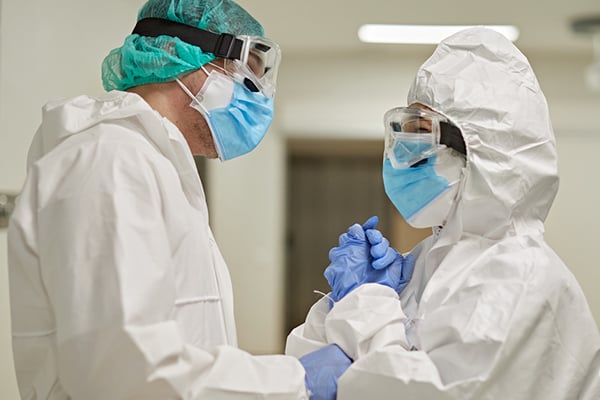Battling COVID Burnout in Emergency Medicine
Battling COVID Burnout in Emergency Medicine
Oct. 3, 2021
With COVID surging, shifts in the emergency department have been rough, to say the least, and our wellness is more important than ever. This episode is all about burnout, self-compassion, and resilience - what we can do for ourselves, our patients, and each other. Host Kim Bambach gets insight from renowned wellness expert Al'ai Alvarez.
Host
Kim Bambach, MD
Medical Education Fellow
Interim Assistant Director of the Kiehl Wellness Endowment
The Ohio State University Wexner Medical Center
Twitter: @kimbambach
EMRA*Cast Episodes
Guest
Al'ai Alvarez, MD, FACEP, FAAEM
Clinical Associate Professor, EM
Director of Wellbeing
Co-Director of Human Potential Team
Director, Emergency Medicine Wellness Fellowship
Stanford University
@alvarezzzy
With COVID surging, shifts in the emergency department have been rough, to say the least, and our wellness is more important than ever. This episode is all about burnout, self-compassion, and resilience - what we can do for ourselves, our patients, and each other.
(Intro music courtesy of TimTaj/Pixabay)
OVERVIEW
More than a year into the COVID-19 pandemic, with multiple highly effective vaccines available, variant strains have arisen, vaccination rates have slowed, and case numbers have surged in the United States. Public gratitude for healthcare workers has turned to mistrust and fear expressed as anger. Resources have become so scarce that some hospital systems have had to ration treatment - utter anathema to those dedicated to providing care.
How can we battle the threat of burnout in the face of these circumstances? Host Kimberly Bambach, MD, speaks with renowned wellness leader Al'ai Alvarez, MD, FACEP, FAAEM. Listen carefully to the full conversation. Then listen again. Take it to heart.
HIGHLIGHTS
Identify the signs and symptoms of burnout.
- Burnout is defined as emotional exhaustion, depersonalization, and decreased sense of personal accomplishment.
- You don't feel like your work matters as much.
- You no longer feel connected - to your team, your patients, or your peers.
- You withdraw.
Monitor appropriately.
- Take stock of yourself on a regular basis. How are you feeling, mentally? Are you caring for yourself physically?
- Check on your colleagues on a regular basis, in a meaningful way.
Battle COVID Cynicism
- Understand we're experiencing daily moral injury, and your reaction to it is normal: feeling cynical, angry, betrayed? That's valid. Save space to let yourself address it.
- Example: Your first instinct is to put your patients first. But you must care for yourself before you can care for them. Take the time to put on PPE (literally and figuratively) before you walk into the room.
- Acknowledge that caring for COVID patients feels different because of the sheer number of cases and also because it carries a risk to your own health and your loved ones' health.
- Accept what you cannot change and realize that if nothing else, you can give your patient the sense that someone cares.
- Give yourself the compassion you've routinely given to patients over the years.
- If it starts impeding your ability to care for yourself or others, then you're moving into the realm of burnout.
How to Make Self-Compassion a Habit in EM
- First, recognize that it's necessary. Studies have shown doctors with the highest level of self-compassion have the lowest incidence of burnout - and vice-versa. Self-compassion is protective.
- Even in training, maintain boundaries to ensure adequate rest, nutrition, and time off.
- Understand your control is limited - and that is not a failure on your part.
- Patients are autonomous and won't always take your advice. Present the facts, offer them care, and accept that’s the limit of what you can do.
- Healthcare systems are stressed and broken. This issue is bigger than any single individual.
- Realize it's a team environment, and we need each other - much like a group in whitewater rafting.
- Maintain good communication with your colleagues.
- Recognize each other's strengths.
- Work together toward a common vision.
Depression or Burnout?
- Depression is a clinical diagnosis that must be taken seriously.
- Create a personal safety checklist:
- These are the things that trigger me.
- These are the people who can help me.
- These are the things that help me move beyond a crisis.
- It's even better to create this list when you are not in crisis mode so that it is available when you need it most and you can identify sources of support around you.
RESOURCES
WellMD's Physician Wellness Forum
Preston Cline (Mission Critical Teams Institute)
- Robustness: You can withstand a punch.
- Resilience: You get knocked down, but you get up.
- Mindfulness: You anticipate the punch.
Kristin Neff (Self-Compassion)
- Self-kindness
- Common humanity
- Mindfulness
ALiEM Wellness archives
EMRA Wellness Guide: A free book of wellness resources by Dr. Arlene Chung, the EM Residency Program Director at Maimonides Medical Center and ACEP Well-being Committee Chair. You can also join the EMRA Wellness Committee.
ACEP resources for emergency physician mental health care





